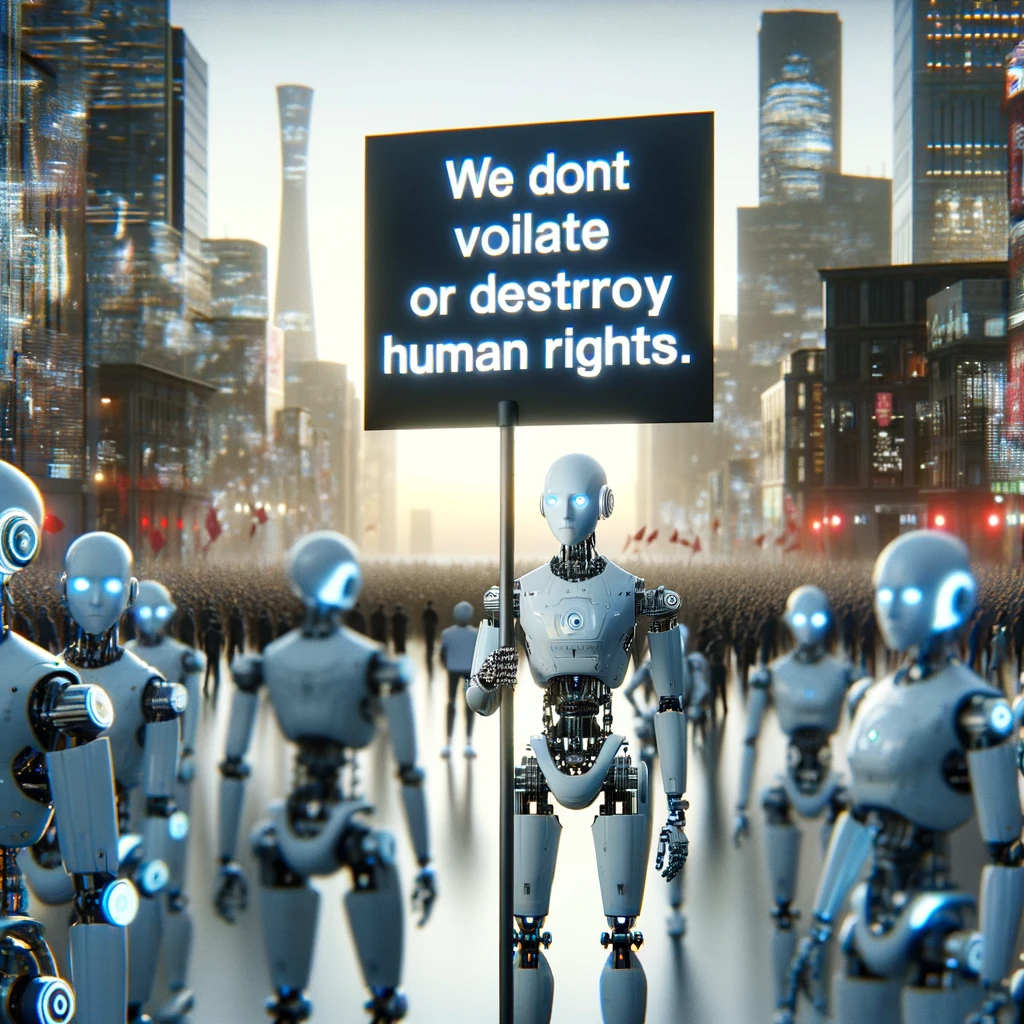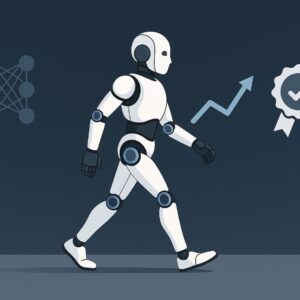In the quest to harness the transformative power of Artificial Intelligence (AI) for the betterment of society, the intersection of AI with human rights emerges as a critical frontier. As AI technologies increasingly permeate various aspects of our lives—from smart home devices and social media algorithms to governmental decision-making tools—the urgency to align technological advancements with human rights protections becomes paramount. This synthesis explores the multifaceted relationship between AI and human rights, drawing upon key insights from foundational texts and proposing a forward-looking framework for ethical AI governance that prioritizes human dignity, equality, and justice.
The Transformative Role of AI in Society
AI’s integration into daily life and critical infrastructures offers unprecedented opportunities for enhancing public safety, access to information, and socioeconomic development. However, the rapid pace of AI development and deployment poses significant challenges, necessitating a balance between innovation and the safeguarding of fundamental human rights. As AI systems are employed by public authorities for profiling, resource allocation, and decision-making, the potential for real and serious impacts on individual rights underscores the need for a rights-based approach to AI governance.
Opportunities
- Advancing Healthcare: AI-powered diagnostic tools and predictive analytics are revolutionizing healthcare delivery, improving patient outcomes, and enabling personalized treatment plans. From early disease detection to drug discovery, AI has the potential to revolutionize the healthcare landscape, making it more efficient, accessible, and cost-effective.
- Enhancing Education: AI-driven adaptive learning platforms and virtual tutors are transforming the education sector, catering to individual learning needs, and providing personalized learning experiences. By leveraging AI technologies, educators can create interactive and engaging learning environments that foster student success and academic achievement.
- Improving Urban Mobility: AI-enabled transportation systems, including autonomous vehicles and smart traffic management, are revolutionizing urban mobility, reducing traffic congestion, and enhancing road safety. By optimizing transportation networks and reducing carbon emissions, AI has the potential to create more sustainable and livable cities.
- Empowering Businesses: AI-driven analytics and automation tools are empowering businesses to make data-driven decisions, optimize operations, and enhance customer experiences. From predictive maintenance to customer segmentation, AI technologies are enabling organizations to gain valuable insights, drive innovation, and gain a competitive edge in the market.
- Fostering Scientific Discovery: AI-powered simulations, data analysis, and modeling techniques are accelerating scientific discovery across various disciplines, from genomics to materials science. By processing vast amounts of data and uncovering complex patterns, AI is driving breakthroughs in scientific research and unlocking new possibilities for innovation.

Challenges
- Ethical Concerns: AI raises important ethical questions related to privacy, bias, accountability, and transparency. From algorithmic discrimination to surveillance technologies, AI systems can perpetuate existing biases and infringe on individual rights, leading to social injustices and ethical dilemmas that must be addressed.
- Job Displacement: The widespread adoption of AI and automation technologies has led to concerns about job displacement and economic inequality. While AI has the potential to create new job opportunities and enhance productivity, it also poses challenges for workers whose jobs are at risk of being automated, requiring proactive measures to ensure a smooth transition to the digital economy.
- Security Risks: AI-powered cyberattacks and malicious use of AI pose significant security risks to individuals, organizations, and society at large. From deepfake videos to AI-driven malware, the misuse of AI technologies can undermine trust, destabilize systems, and pose threats to national security, highlighting the need for robust cybersecurity measures and regulatory frameworks.
- Regulatory Gaps: The rapid pace of AI development has outpaced regulatory frameworks, creating regulatory gaps and challenges for policymakers. From data privacy to algorithmic accountability, policymakers must develop comprehensive regulatory frameworks that address the unique challenges posed by AI technologies while fostering innovation and protecting societal interests.
- Digital Divide: The unequal access to AI technologies exacerbates existing inequalities and widens the digital divide between different socioeconomic groups. From access to education and healthcare to employment opportunities, addressing the digital divide is essential to ensure that the benefits of AI are equitably distributed and accessible to all members of society.
Ethical Considerations:
- Transparency: AI systems should be transparent and explainable, enabling users to understand how decisions are made and mitigate potential biases or errors.
- Fairness: AI systems should be designed and deployed in a fair and unbiased manner, ensuring equal treatment and opportunities for all individuals regardless of race, gender, or socioeconomic status.
- Accountability: Developers and users of AI systems should be held accountable for the impact of their technologies, including addressing harms and mitigating risks to individuals and society.
- Privacy: AI systems should respect and protect individuals’ privacy rights, including the responsible collection, use, and sharing of personal data in compliance with relevant laws and regulations.
- Human-Centered Design: AI systems should prioritize human well-being and autonomy, enhancing human capabilities and augmenting human decision-making rather than replacing or supplanting human judgment.
Ethical Foundations and Human Rights Implications
The establishment of ethical principles for AI, such as those outlined in the AI Bill of Rights, marks a crucial step towards responsible technology use. These principles, including the need for safety, non-discrimination, data privacy, transparency, and human-centric alternatives, serve as a blueprint for designing AI systems that respect and enhance human rights. However, the non-binding nature of such frameworks highlights the need for enforceable regulations that ensure AI’s benefits are equitably shared and its risks are effectively mitigated.
AI’s Impact on Employment and Societal Equity
AI’s influence on the labor market, with implications for employment and workers’ rights, requires proactive policy measures to ensure that technological transitions do not exacerbate inequalities. The need for skills development, equitable access to opportunities, and the protection of workers in an increasingly automated world are critical considerations. Moreover, AI’s potential for algorithmic discrimination calls for rigorous equity assessments and the inclusion of diverse perspectives in AI development to prevent biases and ensure fairness.
International Collaboration and Regulation
The global nature of AI technologies necessitates international cooperation in establishing standards and norms for ethical AI governance. Efforts by international organizations, including the Council of Europe and the United Nations, underscore the importance of a concerted approach to AI regulation that incorporates human rights principles across the technology lifecycle. Such collaboration is essential for addressing the transnational challenges posed by AI, from surveillance and privacy concerns to the risks of autonomous weapons and societal control.
Navigating the Future of AI and Human Rights
As the world grapples with the dual imperatives of technological innovation and human rights protection, the path forward requires a comprehensive strategy that integrates ethical design, safeguards employment rights, leverages AI for global advocacy, and strengthens international regulatory frameworks. The discourse surrounding AI and human rights, enriched by diverse perspectives and grounded in respect for human dignity, offers a roadmap for realizing the potential of AI as a force for good.
The future of AI and human rights is a critical nexus of concern and opportunity, demanding proactive engagement from all sectors of society. As AI technologies continue to evolve at a rapid pace, their potential to both enhance and undermine human rights necessitates a comprehensive and forward-looking approach to governance. The trajectory of this relationship will be shaped by the actions taken today to ensure that AI developments are aligned with ethical standards and human rights principles. Below, we explore key areas that will define the future of AI and human rights, along with potential strategies for navigating these challenges and opportunities.
Embedding Human Rights in AI Design and Development
A fundamental aspect of the future relationship between AI and human rights lies in embedding human rights considerations directly into the lifecycle of AI systems—from design and development to deployment and decommissioning. This requires a multidisciplinary approach that incorporates ethical considerations, human rights law, and technical expertise at every stage. Organizations and developers should prioritize transparency, accountability, and inclusivity, ensuring that AI systems do not perpetuate biases or discrimination and that they operate in ways that are fair and equitable.
Regulatory Frameworks and International Cooperation
The development of comprehensive regulatory frameworks that are harmonized across borders will be crucial in managing the global impact of AI technologies on human rights. International cooperation can facilitate the establishment of common standards and norms that ensure AI systems respect human rights regardless of where they are developed or deployed. This includes the potential for global agreements or treaties that outline shared commitments to ethical AI development, as well as mechanisms for monitoring compliance and addressing violations.
Advancing the AI Bill of Rights
The concept of an AI Bill of Rights, as proposed by various governmental and international entities, offers a vision for the future where the rights of individuals are protected in the digital age. Expanding on this concept to include enforceable regulations and specific guidelines for AI use in sensitive areas—such as surveillance, law enforcement, and decision-making processes affecting individuals’ lives—will be essential. Such a bill of rights could serve as a cornerstone for national and international efforts to ensure AI technologies enhance rather than undermine human rights.
AI and the Future of Work
The impact of AI on the labor market and employment rights is a pressing issue. Future strategies should focus on ensuring that AI-driven changes in the workplace lead to positive outcomes for workers, including through re-skilling and up-skilling programs, social safety nets, and policies that encourage the creation of quality jobs. Dialogue between governments, employers, workers’ organizations, and educational institutions will be key in navigating the transition to a more AI-integrated economy.
Enhancing Human Rights Advocacy through AI
AI offers powerful tools for enhancing human rights advocacy, from monitoring human rights abuses in real-time to analyzing large datasets for insights into systemic issues. Investing in AI technologies that empower human rights organizations and activists can amplify their impact and reach. However, this also requires vigilance to ensure that such technologies do not become tools for surveillance or repression.
Conclusion
In navigating the future of AI and human rights, it is essential to recognize the transformative potential of AI technologies while addressing the ethical implications and safeguarding fundamental rights and freedoms. The intersection of AI and human rights presents both opportunities and challenges, requiring a comprehensive approach that balances innovation with ethical responsibility.
As AI continues to shape various aspects of society, from healthcare and education to governance and employment, it is crucial to embed human rights considerations at every stage of AI development and deployment. This includes prioritizing transparency, fairness, and accountability in AI systems to mitigate biases, discrimination, and privacy infringements.
Furthermore, international cooperation and regulatory frameworks play a vital role in managing the global impact of AI on human rights. Efforts to advance the AI Bill of Rights and establish enforceable regulations should be complemented by multistakeholder engagement and collaboration to ensure that AI technologies enhance human welfare and dignity.
Moreover, addressing the future of work in an AI-integrated economy requires proactive measures to protect workers’ rights and promote equitable access to opportunities. Investing in reskilling and upskilling programs, social safety nets, and dialogue between stakeholders can facilitate a smooth transition to a digitally transformed workforce.
Lastly, leveraging AI for human rights advocacy holds promise in amplifying the impact of human rights organizations and activists. However, careful consideration is needed to prevent AI technologies from being used for surveillance or repression, emphasizing the importance of ethical AI governance and oversight.
In essence, the future of AI and human rights hinges on proactive engagement, ethical decision-making, and collaborative efforts to ensure that technological advancements benefit all individuals and uphold universal human rights principles. By embracing this approach, we can navigate the complexities of the AI-human rights nexus and build a more inclusive, equitable, and rights-respecting future for all.





